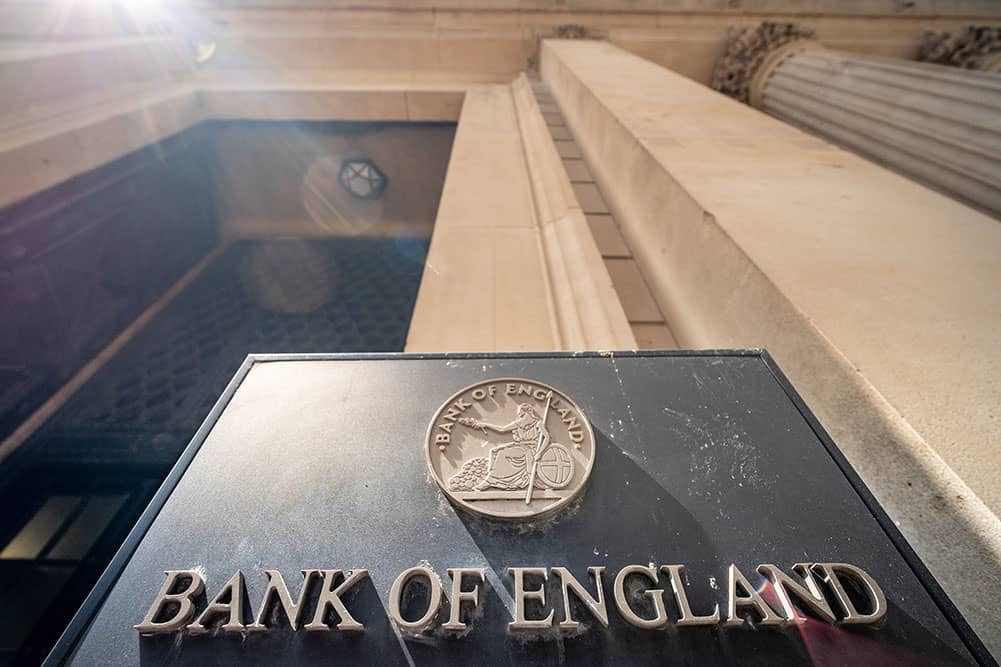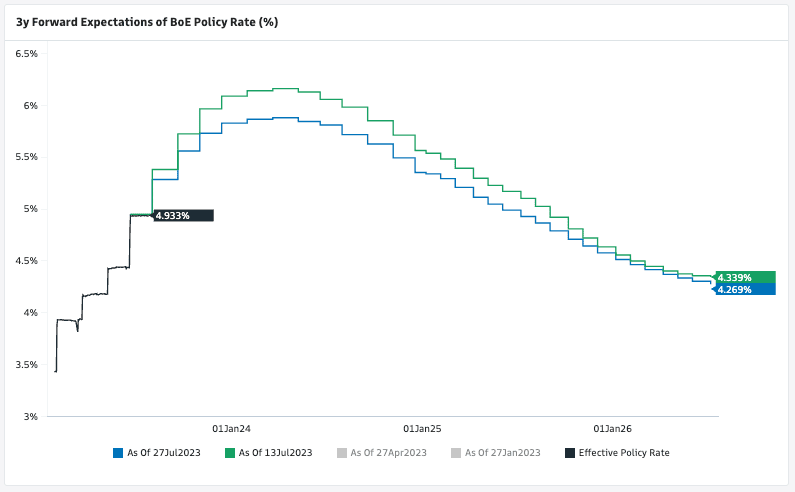Pound Sterling: Bank of England Downshift Could Spell Weakness say Analysts
- Written by: Gary Howes
Analysts at TD Securities say the biggest downside risk to the Pound involves the Bank hiking by 50bp and saying this is the final hike.

Image © Adobe Stock
The British Pound was offered against the Euro and Dollar as investors reduced exposure ahead of Thursday's Bank of England decision where anything other than a 50 basis point interest rate hike could result in declines according to some currency market professionals we follow.
Money market pricing shows investors expect a ~34 basis point hike from the Bank, which is effectively a split opinion on either a 25bp or 50bp move from the Bank.
"With expectations split down the middle between a 25bp and a 50bp move. That pretty much guarantees a reaction," says Kit Juckes, an analyst at Société Générale.
Juckes says the Pound is vulnerable if the Bank of England doesn't hike by 50bp. "Given where expectations are that leaves GBP vulnerable this week. 25bp from the Bank, and solid US data, could easily drag GBP/USD back below 1.25," he warns.
The Pound to Dollar exchange rate was as high as 1.31 in mid-July but has steadily retreated to 1.2700 at the time of writing on Thursday. The Pound to Euro rate had been as high as 1.1750 on July 11 but has fallen back to 1.1630.
The case for a 25bp hike with a warning there could yet be more to come, "would seem sensible," says Juckes, particularly given with inflation and house prices are falling.
"The Bank of England will likely shift gears down to a 25bp rate hike at its MPC meeting on Thursday. The cooler June inflation data has eased the pressure on policymakers, even though wage growth remains a concern. They may well use the 'data dependent' card going forward, like other major central banks," says Jamie Dutta, Market Analyst at Vantage.
Kristian Brauten-Smith, an FX trader at Goldman Sachs says the Pound would likely retreat on anything but a 50bp hike as the Bank of England would risk squandering the credibility it has been fighting to restore.
"Taking a step back to reflect on the June BoE meeting, and for the first time in almost 18 months, the Bank managed to regain an element of credibility, reacting to the shockingly high inflation read for May with a surprise 50bp hike," the trader says.
Above: GBP consistently falls on Bank of England days. Image courtesy of Goldman Sachs.
The FX trading desk at Goldman Sachs is "of the belief that a continuation along this path and delivery of another 50bp is the correct angle for August, and that this is by far the most supportive outcome for Sterling."
Brauten-Smith explains the Pound has a tendency to suffer on BoE meetings despite the cumulative delivery of hikes over the past 12 months being the greatest in G10.
"Bailey can correct this whilst re-building the Bank's credibility by delivering 50bp in August, all with the appearance of a more cohesive response assuming Tenreyro's replacement Green translates into a vote with the majority," he says.
Above: Expectations for the peak in Bank Rate have come down through July, a development that corresponds with a weaker Pound in this period. Image courtesy of Goldman Sachs.
A 50bp hike can help the Pound to Dollar exchange rate regain a footing above 1.30 and support Pound Sterling more generally, as this relative front loading comes at a time when other central banks have seemingly completed their final hikes.
"A 25bp delivery risks a near-term outcome of lower GBP," says Brauten-Smith, "but we believe this will be short-lived."
The Goldman Sachs trader looks for dips in the Pound-Dollar exchange rate to be limited to 75-90 with a 35-50 pip decline in the Pound to Euro exchange rate possible.
Compare Currency Exchange Rates
Find out how much you could save on your international transfer
Estimated saving compared to high street banks:
£2,500.00
Free • No obligation • Takes 2 minutes
"We would rather fade both, but will likely take our time before engaging in our full position to such an outcome," says Brauten-Smith.
Analysts at TD Securities say the biggest downside risk to the Pound involves the Bank hiking by 50bp and saying this is the final hike. Their scenario analysis sees a 10% chance of such an outcome and say it could result in a near 0.80% decline in the value of the Pound.
Under such a scenario the 50bp hike is accompanied by language that the move was aimed at "rushing" to a terminal level, with forward guidance raising the bar for future hikes.
Last week the Federal Reserve and European Central Bank said they were not committing to raising interest rates again in September as they wanted to see the nature of the next set of economic data.
These moves potentially open the door for the Bank of England to seek alignment by also looking to signal an end to its own hiking cycle.
This would be welcomed by businesses and mortgage holders, but for the Pound, this could result in weakness.
Above: The 'cheat sheet' from TD Securities.
Compare Currency Exchange Rates
Find out how much you could save on your international transfer
Estimated saving compared to high street banks:
£2,500.00
Free • No obligation • Takes 2 minutes







